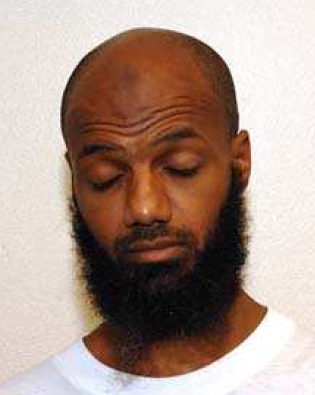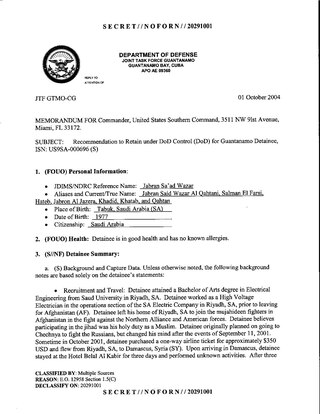
Mustafa Ahmed Adam al-Hawsawi is a Saudi Arabian citizen. He is alleged to have acted as a key financial facilitator for the September 11 attacks in the United States.

Omar Ahmed Said Khadr is a Canadian citizen who at the age of 15 was detained by the United States at Guantanamo Bay for ten years, during which he pleaded guilty to the murder of U.S. Army Sergeant 1st Class Christopher Speer and other charges. He later appealed his conviction, claiming that he falsely pleaded guilty so that he could return to Canada where he remained in custody for three additional years. Khadr sued the Canadian government for infringing his rights under the Charter of Rights and Freedoms; this lawsuit was settled in 2017 with a CA$10.5 million payment and an apology by the federal government.

Binyam Ahmed Mohamed, also referred to as Benjamin Mohammed, Benyam Mohammed or Benyam Mohammed al-Habashi, is an Ethiopian national and United Kingdom resident, who was detained as a suspected enemy combatant by the US Government in Guantanamo Bay prison between 2004 and 2009 without charges. He was arrested in Pakistan and transported first to Morocco under the US's extraordinary rendition program, where he claimed to have been interrogated under torture.
Issa Ali Abdullah al Murbati is a citizen of Bahrain who was held in extrajudicial detention in the United States Guantanamo Bay detainment camps, in Cuba. Al Murbati's Guantanamo Internment Serial Number was 52. American counter-terrorism analysts estimate he was born in 1965, in Manama, Bahrain.

Jabran Said Bin Wazir al-Qahtani is a Saudi who was held in extrajudicial detention for almost fifteen years in the United States Guantanamo Bay detention camps, in Cuba. Joint Task Force Guantanamo analysts estimate he was born in 1977, in Tabuk, Saudi Arabia.
Ghassan Abdallah Ghazi al-Sharbi is a Saudi currently held in extrajudicial detention in the United States Guantanamo Bay detention camps, in Cuba. His Guantanamo Internment Serial Number is 682. He graduated from Embry-Riddle Aeronautical University in Prescott, Arizona with a degree in electrical engineering. The US Department of Defense reports that he was born on December 28, 1974, in Jeddah, Saudi Arabia.

Abdul Zahir (عبدالظاهر) is a citizen of Afghanistan currently held in extrajudicial detention in the United States' Guantanamo Bay detention camps, in Cuba. He was the tenth captive, and the first Afghan, to face charges before the first Presidentially authorized Guantanamo military commissions. After the Supreme Court ruled that the President lacked the constitutional authority to set up military commissions, the United States Congress passed the Military Commissions Act of 2006, he was not charged under that system.
Hamidullah was a citizen of Afghanistan, who was held in extrajudicial detention in the United States's Guantanamo Bay detention camps, in Cuba. His Guantanamo Internee Security Number is 1119. Joint Task Force Guantanamo counter-terrorism analysts estimate he was born in 1963, in Kabul, Afghanistan.

Obaidullah is a citizen of Afghanistan who was one of the last remaining Afghan detainees held in extrajudicial detention in the United States Guantanamo Bay detention camp, in Cuba. He was captured as an Enemy combatant on July 20, 2002, transferred to Guantanamo on October 28, 2002, and transferred to the United Arab Emirates on August 15, 2016. Obaidullah's Guantanamo Internment Serial Number is 762. American intelligence analysts estimate that Obaidullah was born in 1980 in Khowst, Afghanistan.
Jawad Jabber Sadkhan is a citizen of Iraq who was held in extrajudicial detention in the United States Guantanamo Bay detainment camps, in Cuba. Sadkhan's Guantanamo Internment Serial Number was 433.
Noor Uthman Muhammed is a citizen of Sudan who was confined in the United States Guantanamo Bay detention camp, in Cuba where he served a sentence for terrorism convictions before the Guantanamo military commission

Mohamed Jawad, was accused of attempted murder before a Guantanamo military commission on charges that he threw a grenade at a passing American convoy on December 17, 2002. Jawad's family says that he was 12 years old at the time of his detention in 2002. The United States Department of Defense maintains that a bone scan showed he was about 17 when taken into custody.
Bostan Karim(also transliterated as Bostan Qaseem) is a citizen of Afghanistan, who was held in extrajudicial detention in the United States Guantanamo Bay detainment camps, in Cuba. Karim's Guantanamo detainee ID number was 975. Guantanamo counter-terrorism analysts estimate he was born in 1970, in Khost, Afghanistan.

The Behavioral Science Consultation Teams are groups of psychiatrists, other medical doctors and psychologists who study detainees in American extrajudicial detention.
Jawed Ahmad (Jojo) was an Afghan reporter working for Canadian media outlet CTV who was arrested by American troops and declared an enemy combatant, while working with NATO at Kandahar Airport on October 26, 2007.
Colonel Stephen R. Henley is an American lawyer and an officer in the United States Army.
The frequent flyer program is a controversial technique used by the U.S. in the Guantanamo Bay detainment camps, in Cuba. Guards deprived detainees of sleep by moving them from one cell to another, multiple times a day, for days or weeks on end.

David Frakt is an American lawyer, law professor, and officer in the United States Air Force Reserve.
Sufyian Ibn Muhammad Barhoumi is an Algerian man who was held in extrajudicial detention in the United States Guantanamo Bay detention camps, in Cuba. The Department of Defense reports that he was born on July 28, 1973, in Algiers, Algeria.









